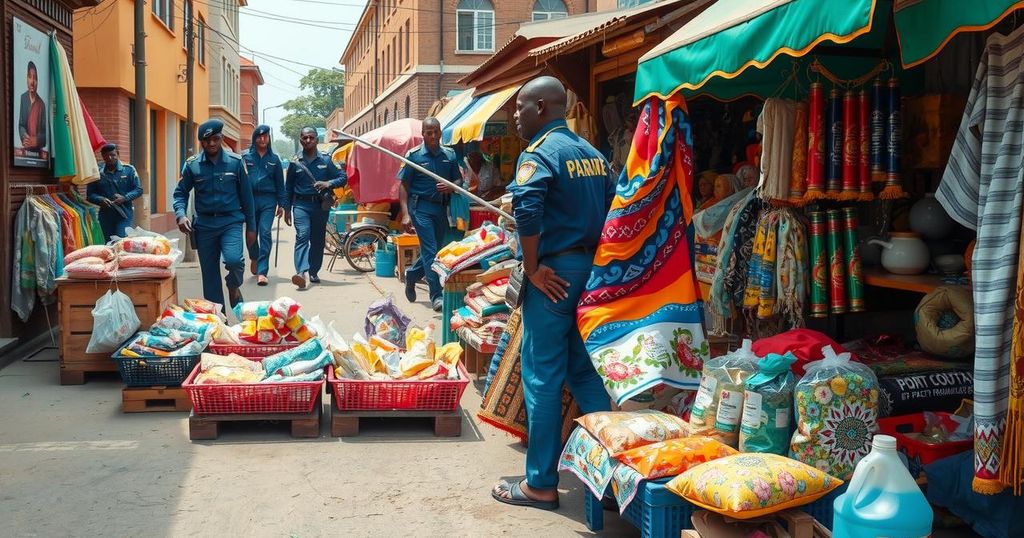Why Are Zimbabwe Police Chasing Off Some of the Economy’s Biggest Players?

Street vendors in Harare are facing relentless crackdowns from municipal police as local authorities intensify efforts to manage informal vending activities. Despite the vendors’ crucial economic role and the mismatch in resource allocation, the city continues its aggressive approach, raising concerns among critics regarding the impact on livelihoods and the use of public funds.
In Harare, Zimbabwe, street vendors are often caught off guard by municipal police raids. The process is swift and chaotic; vendors flee in panic as their goods are seized. Saul Nhema, an informal vendor who lost his construction job, recalls, “They have no mercy at all. Once they take your stock, you’ll never get it back.” Such raids are a regular occurrence, with the police having already descended twice in one day along Park Street.
The Harare City Council has been aggressive in its efforts to curb informal vending, citing concerns over bylaw violations, health hazards, and littering. However, the scale of these operations has drawn criticism, especially when resources are scarce. Critics argue that the council is misallocating funds that could better serve residents, like providing basic services such as clean water. The city’s budget faced a glaring discrepancy, with policing costs soaring to over $24 million against a revenue of just $3 million in 2024.
In 2025, the council did not relent. They launched a specialized police unit specifically to tackle vendors. This move resulted in a heightened financial squeeze, as their projected income of only $2 million meant policing costs could reach nearly 12 times that. Meanwhile, the burden increasingly fell on the central government, raising questions about the viability of such tactics.
Vendors like Saul Nhema and his colleague Zvikomborero Guvheya play an important role in the economy, even though they face constant harassment from the municipal police. Global Press Journal reached out multiple times for an interview with the mayor, but there was no response. Reuben Akili of the Combined Harare Residents Association criticized the special unit, saying that expenses for enforcement could have been better invested into infrastructure development for vendors.
With over 80% of Zimbabwe’s population relying on the informal sector, and vendors contributing nearly 72% to the GDP, their importance can’t be overstated. Street vending is a widespread livelihood among many African nations, offering essential jobs, especially for women. Yet, this crucial workforce often faces eviction, labeled as a nuisance to urban order.
Akili argued that the new municipal unit only adds to the already existing burden on tax payers, proposing that instead of policing, the city should create better working environments for vendors. While there are designated market spaces, vendors often avoid them due to high rental costs and the requirement of a formal business license, which can range from $400 to $800 annually—prohibitive given the economy’s struggles.
Samuel Wadzai from the Vendors Initiative for Social and Economic Transformation pointed out that raids were ineffective. He referred to a past recommendation for military intervention that failed to resolve the issues vendors face. “Did that result in any significant change in terms of the challenges we are seeing? I think it’s a big no,” Wadzai noted.
For some vendors, bribing police has become a survival tactic. Jesman Guvheya, a widow with five children, relayed that officers might demand $1 daily. Yet, as there are multiple groups of police working throughout the day, a vendor could end up paying $4 just to avoid being raided. The bribe, however, is no guarantee of safety, and many have experienced the loss of their goods despite having paid off the police.
The ongoing tension between Harare’s municipal authorities and informal vendors illustrates a larger issue: the struggle to balance urban order and economic necessity. With significant financial resources devoted to policing, critics argue that the city should instead focus on supporting the livelihoods that sustain a vast majority of its population. Without a shift in strategy, the cycle of raids and evictions will likely continue, further complicating the lives of vendors who are vital to Zimbabwe’s economy.
Original Source: www.thezimbabwean.co







